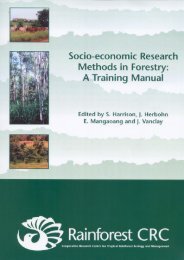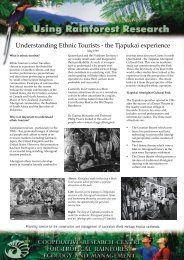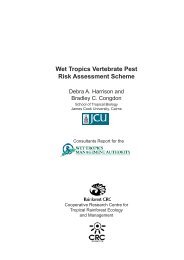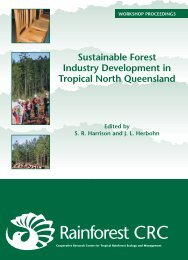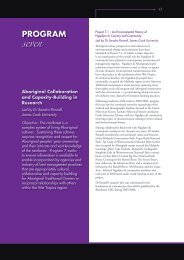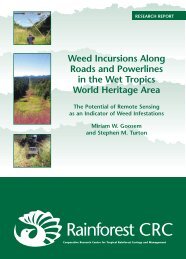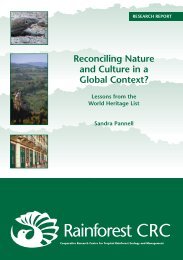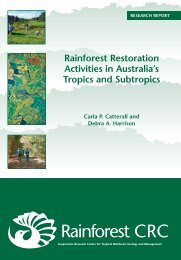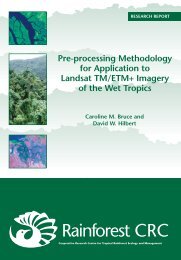S<strong>and</strong>ra Pannell1996). In TNC’s Edenic vision of nature, only exotic biodiversity or endangered speciesbelong or are acknowledged as hav<strong>in</strong>g a rightful place <strong>in</strong> Komodo National Park. At best, thecurrent management plan talks about the possibility of grant<strong>in</strong>g limited ‘use rights’ to humanresidents <strong>in</strong> the Park via a system of permits <strong>and</strong> licences (PHKA <strong>and</strong> TNC 2000, Vol. 2:141). If there is a sense of local ownership conveyed through the management objectives ofthe Park, it is <strong>in</strong> regard to the environmental ‘problems’ identified <strong>in</strong> the Park, rather than toownership of the Park itself. At the present time, local communities appear to have lessrights <strong>and</strong> less say <strong>in</strong> the day-to-day management of the Park than The <strong>Nature</strong> Conservancy<strong>and</strong> its <strong>in</strong>ternationally based <strong>in</strong>vestors. Indeed, it is difficult to know what villagers have tosay about the imposition of the ‘Komodo Community Management Initiative’, particularly astheir opposition to <strong>and</strong> contestation of the new regime is reduced to ‘community <strong>in</strong>difference’or is identified as requir<strong>in</strong>g an <strong>in</strong>tensification of ‘socialisation activities’ <strong>in</strong> TNC’s reports on‘stakeholder consultations’ (see Bakar 1996; TNC 2003).Us<strong>in</strong>g nature preservation as the “measure <strong>and</strong> arbiter” (Katz 1998: 57) of rightfulness <strong>and</strong> ofwhat constitutes a global good, produces an ugly environmental politics. It also produces al<strong>and</strong>scape of ‘nature cemeteries’ (Luke 1995: 17), for the most part, off limits to the liv<strong>in</strong>g. Inthe context of Komodo National Park, the production of these very un-natural spaces, wipedclean of culture, is further reified by the World Heritage list<strong>in</strong>g of the Park solely for its naturalvalues. In many respects, the World Heritage status of the Park serves to legitimate thememorialised view of nature preserved by TNC. List<strong>in</strong>g also elevates TNC’s global efforts tocreate nature theme parks, where the presence of biodiversity provides “enterta<strong>in</strong>ment value”(Luke 1995: 20) for its <strong>in</strong>vestors, to the level of a common public good. In the pursuit <strong>and</strong>delivery of this global public good, it is apparent that certa<strong>in</strong> articles of the World HeritageConvention are disregarded or paid lip-service to by the Government of Indonesia <strong>in</strong> theirpartnership with TNC. As a signatory to the Convention, the Indonesian authorities have aformal obligation to give recognised World Heritage a “function <strong>in</strong> the life of the community”(see Article 5 of the World Heritage Convention, UNESCO 1972) <strong>and</strong> are encouraged to“ensure the participation of a wide variety of stakeholders […] <strong>in</strong> the identification, nom<strong>in</strong>ation<strong>and</strong> protection of World Heritage properties” (UNESCO 2005: 3). In the context of themanagement of Komodo National Park, the local community is depicted as a dysfunctionalelement of World Heritage, while from the po<strong>in</strong>t of view of the Park’s residents, stakeholderparticipation <strong>in</strong> protection measures is largely characterised by prohibitions, penalties <strong>and</strong>penal sentences 49 .As evident <strong>in</strong> Komodo National Park, The <strong>Nature</strong> Conservancy <strong>and</strong> the World HeritageCommittee are assisted <strong>in</strong> their efforts to ‘save’ nature for (certa<strong>in</strong> k<strong>in</strong>ds of) humanity by an<strong>in</strong>ternational array of scientists <strong>and</strong> other experts. The officials <strong>and</strong> the many experts whocomprise the UNESCO network are part of an <strong>in</strong>ternational elite. As David Harrisonobserves, members of this elite group “may deliberately or unwitt<strong>in</strong>gly <strong>in</strong>fluence which built,natural or cultural sites are selected for possible <strong>in</strong>clusion on the World Heritage List” (2005:8). As governments <strong>and</strong> regional authorities <strong>in</strong>creas<strong>in</strong>gly look to World Heritage list<strong>in</strong>g as ameans of deliver<strong>in</strong>g economic benefits <strong>and</strong> a much-sought after <strong>in</strong>ternational status fromglobal tourism, expert <strong>in</strong>put <strong>and</strong> advice is accorded greater political currency <strong>and</strong> leverage.In this commonly found scenario, as Harrison concludes, “‘supervision’ by experts sometimescomes to mean dom<strong>in</strong>ation by experts” (2005: 8-9). In the case of so many World Heritagesites <strong>in</strong> ‘develop<strong>in</strong>g countries’ conservation advice not only comes from ‘experts’, but it alsocomes from former colonists (see Evans 2005: 44).49 As reported by TNC-sponsored researchers, Pet <strong>and</strong> Subijanto, <strong>in</strong> ‘Enforcement <strong>and</strong> Protection ofKomodo National Park’, <strong>in</strong> the period 4 March 2000-1 March 2001, 38 men from villages with<strong>in</strong> <strong>and</strong>surround<strong>in</strong>g the national park were given jail sentences, rang<strong>in</strong>g <strong>in</strong> length from 6 months to 3 years,for ‘deer poach<strong>in</strong>g’ <strong>and</strong> ‘illegal fish<strong>in</strong>g’ activities (2001).44
<strong>Reconcil<strong>in</strong>g</strong> <strong>Nature</strong> <strong>and</strong> <strong>Culture</strong> <strong>in</strong> a <strong>Global</strong> <strong>Context</strong>?Lessons from the World Heritage ListThis relationship between ‘experts’, the state <strong>and</strong> nature conservation has a long history. AsRichard Grove po<strong>in</strong>ts out, the orig<strong>in</strong>s <strong>and</strong> growth of environmentalism “depended on theemergence of a coterie of professional scientists” (1995). Today, just as was the case <strong>in</strong> thepast (Grove 1995: 12), the prescriptions of scientists regard<strong>in</strong>g nature are commonlysubord<strong>in</strong>ated to the needs of nation-states. Unlike the past, however, nowadays they arealso constra<strong>in</strong>ed by the <strong>in</strong>terests of transnational environmental organisations, like The<strong>Nature</strong> Conservancy, or are subject to the requirements of global <strong>in</strong>struments, such as theWorld Heritage Convention. Perhaps the greatest restra<strong>in</strong><strong>in</strong>g factor stems from themethodologies of science engaged <strong>in</strong> the cause of nature conservation. As Graeme Evansobserves, the cultural monument-nature conservation approach to heritage, whichunderscores the Convention, appears “unable to reconcile the very real conflicts <strong>and</strong>tensions between State <strong>in</strong>tervention <strong>and</strong> compliance with <strong>in</strong>ternational agency criteria, <strong>and</strong>local / regional governance <strong>and</strong> community concerns” (2005: 39).As these comments suggest, the <strong>in</strong>ternational presentation <strong>and</strong> ‘performance’ of heritage is“l<strong>in</strong>ked to power: the power to impose a view of the world” (Harrison 2005: 9). Preserv<strong>in</strong>gheritage, whether natural or cultural, for the sake of posterity, humanity, biodiversity, or as aresponse to development, endangerment, destruction, or some other form of postulated‘global good’, runs the risks of re<strong>in</strong>stat<strong>in</strong>g many of the values <strong>and</strong> relationships identified withthe far-flung projects of colonialism. In the next section, I explore the construction <strong>and</strong>preservation of some of these colonial projects as World Heritage.45




